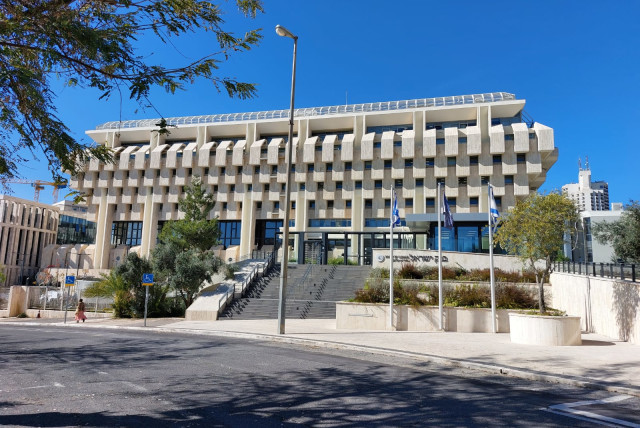Bank of Israel warns: Economy at risk, judicial reform to blame

According to the BoI’s latest report, judicial reform and inflation rate adjustments are the primary factors that can significantly impact Israel’s risk premium.
On Wednesday the Bank of Israel issued its biannual financial stability report for the first half of 2023, covering a period marked by declining rates in both currency and commerce.
The report underscores that the uncertainty surrounding the government’s legal reform legislation has increased the risk premium of the economy. This has been accompanied by a devaluation of the exchange rate, leading to a rise in inflation, a decline in stock prices, and increased volatility in both the foreign exchange and financial markets.
The bank further cautioned that if interest rate adjustments and the judicial reform intensify further, they may pose challenges to the financial system in the medium term.
Despite the challenges, the report described the Israeli financial system as stable. It acknowledged the resilience of banks, insurance companies, and Israeli households which have managed to build up "security cushions” that helped them cope with potential shocks effectively.
The bank's analysis reveals that during February and March, coinciding with progress in the legal reform, the risk premium of the economy surged while the value of the shekel significantly decreased. However, as the legislative processes were not unilaterally promoted, the intensity of the shocks subsided. Nevertheless, the outcomes were noteworthy, with the Tel Aviv 125 index experiencing a 2.1% drop, and the shekel depreciating by 2.7% against the dollar during the first half of the year. This occurred at a time when stock indices were rising globally, and the dollar was weakening against other major currencies.
BoI warns that the risks are not just immediate
The Bank of Israel cautions that the risks associated with the legislative procedures may not be limited to the immediate term. The medium-term impact of such structural changes, which might be perceived as weakening the independence of institutions, includes potential deterioration in sentiment, business culture, growth, investor confidence, and the overall attractiveness of the economy.
Looking ahead, the bank points out several dangers in the medium term. These include a potential decrease in foreign investments, an increase in the cost of debt, and a decline in the credibility of policymakers. The concerns raised in the report align with similar observations made by international organizations, including the International Monetary Fund, the OECD, and major credit rating agencies.
One of the areas under scrutiny is the stability of households amidst the interest rate increases. The report indicates that households have remained relatively stable; however, they still face significant challenges. For instance, those who took out mortgages in 2021 are now dealing with an average additional monthly repayment of NIS 1,417, with about a thousand shekels attributed solely to the mortgage component. This rise in monthly repayments comes after a year of consecutive interest rate increases, substantially inflating the prime component of mortgages.
The report also highlights the impact on mortgage holders from different periods. Fresh mortgage takers in 2021 experienced the most significant increase of NIS 1,417 in their monthly repayments. Comparatively, those who took out a mortgage a year earlier faced an increase of NIS 1,148, while those who took out a mortgage three years earlier saw their repayments rise by NIS 962.
A firm reminder to the Prime Minister
In response to the report, the hi-tech protest group expressed concern about the government's handling of the economy. “The Bank of Israel report proves once again how arrogantly and methodically, while ignoring the warnings of experts, the [Prime Minister Benjamin] Netanyahu government is destroying Israel's economy, it stated. “Netanyahu and Smotrich can continue their lies about a solid economy that will be revealed when the dust settles, but the truth is that this is not dust, but an economic desert they are leading us into."
Professor Dan Ben-David, head of the Shoresh Institution for Socioeconomic Research and an economist at Tel-Aviv University, noted that despite Netanyahu's attempts to blame mass protests and international noise for the economy’s turmoil, the central bank's analysis indicates otherwise.
“Netanyahu has been on an interview blitz with foreign news organizations (while refusing to be interviewed by Israeli media in Hebrew), countering Israel’s leading academic economists, it’s top business leaders and foreign banks and credit agencies by telling them that it’s not his government’s attempted judicial coup that is causing Israel’s massive economic losses since the recent elections,” he explained. “Israel’s professional, apolitical, Central Bank has just reaffirmed what its earlier findings have already shown: the attempted judicial coup that Netanyahu is trying to whitewash has caused such uncertainty and apprehension that money is leaving Israel. This has been having direct negative effects on the country’s stock market and weakening shekel, which in turn spurs local inflation even higher.”
Ben-David noted that the long-term consequences of the current government’s actions overshadow the short- or medium-term effects highlighted in the report. “It’s not just the anti-democratic laws that the government has passed, or that are on the docket. It is also their toxic tearing down of the professionals manning their cabinet ministries who dare contradict unsubstantiated populist claims with actual data,” he said.
The passing of anti-democratic laws and the potential for more to come exacerbates the situation, fueling concerns about the erosion of democratic principles in the country, he argued. “This government is basically torching everything that it took Israel decades to build. The Bank of Israel's higher risk assessment is only the canary in the coal mine.”
Jerusalem Post Store
`; document.getElementById("linkPremium").innerHTML = cont; var divWithLink = document.getElementById("premium-link"); if (divWithLink !== null && divWithLink !== 'undefined') { divWithLink.style.border = "solid 1px #cb0f3e"; divWithLink.style.textAlign = "center"; divWithLink.style.marginBottom = "15px"; divWithLink.style.marginTop = "15px"; divWithLink.style.width = "100%"; divWithLink.style.backgroundColor = "#122952"; divWithLink.style.color = "#ffffff"; divWithLink.style.lineHeight = "1.5"; } } (function (v, i) { });


